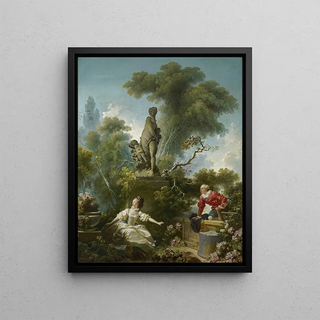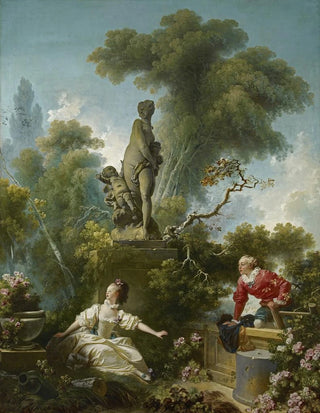Art print | Le Progrès de l'Amour La Rencontre - Jean-Honoré Fragonard


View from behind

Frame (optional)
In the vast panorama of art history, certain works stand out for their ability to capture the essence of human emotions. The Art print of "Le Progrès de l'Amour La Rencontre" by Jean-Honoré Fragonard is one of those creations that, through its delicacy and boldness, immerses the viewer in a universe of romance and passion. This canvas, emblematic of the Rococo movement, brilliantly illustrates the subtleties of romantic relationships through a rich and evocative visual language. The depicted scene, where two lovers meet in an idyllic setting, evokes feelings of desire and mystery, inviting the gaze to explore the nuances of human intimacy.
Style and uniqueness of the work
Fragonard, an undisputed master of Rococo, excels in the art of lightness and elegance. In "Le Progrès de l'Amour La Rencontre," he uses a palette of soft colors, ranging between pastels and brighter shades, to create an atmosphere that is both enchanting and dreamlike. The composition, skillfully orchestrated, reveals a subtle play between shadow and light, emphasizing the expressions of the characters while harmoniously integrating them into their environment. The meticulous details, from the drapes of clothing to the lush foliage, testify to a keen sense of observation and remarkable technical mastery. Every element of the canvas contributes to the visual storytelling, transforming a simple romantic encounter into a scene charged with symbolism and poetry.
The artist and his influence
Jean-Honoré Fragonard, born in 1732 in Grasse, is one of the most emblematic artists of the 18th century. His work is set within an artistic context marked by the pursuit of lightness and pleasure, in opposition to the rigors of Neoclassicism that would emerge later. Fragonard captured the spirit of his time, celebrating life, love, and sensuality through intimate and vibrant scenes. His influence extends far beyond his era, inspiring many artists and subsequent movements. The themes of passion and the quest for love

Matte finish

View from behind

Frame (optional)
In the vast panorama of art history, certain works stand out for their ability to capture the essence of human emotions. The Art print of "Le Progrès de l'Amour La Rencontre" by Jean-Honoré Fragonard is one of those creations that, through its delicacy and boldness, immerses the viewer in a universe of romance and passion. This canvas, emblematic of the Rococo movement, brilliantly illustrates the subtleties of romantic relationships through a rich and evocative visual language. The depicted scene, where two lovers meet in an idyllic setting, evokes feelings of desire and mystery, inviting the gaze to explore the nuances of human intimacy.
Style and uniqueness of the work
Fragonard, an undisputed master of Rococo, excels in the art of lightness and elegance. In "Le Progrès de l'Amour La Rencontre," he uses a palette of soft colors, ranging between pastels and brighter shades, to create an atmosphere that is both enchanting and dreamlike. The composition, skillfully orchestrated, reveals a subtle play between shadow and light, emphasizing the expressions of the characters while harmoniously integrating them into their environment. The meticulous details, from the drapes of clothing to the lush foliage, testify to a keen sense of observation and remarkable technical mastery. Every element of the canvas contributes to the visual storytelling, transforming a simple romantic encounter into a scene charged with symbolism and poetry.
The artist and his influence
Jean-Honoré Fragonard, born in 1732 in Grasse, is one of the most emblematic artists of the 18th century. His work is set within an artistic context marked by the pursuit of lightness and pleasure, in opposition to the rigors of Neoclassicism that would emerge later. Fragonard captured the spirit of his time, celebrating life, love, and sensuality through intimate and vibrant scenes. His influence extends far beyond his era, inspiring many artists and subsequent movements. The themes of passion and the quest for love






